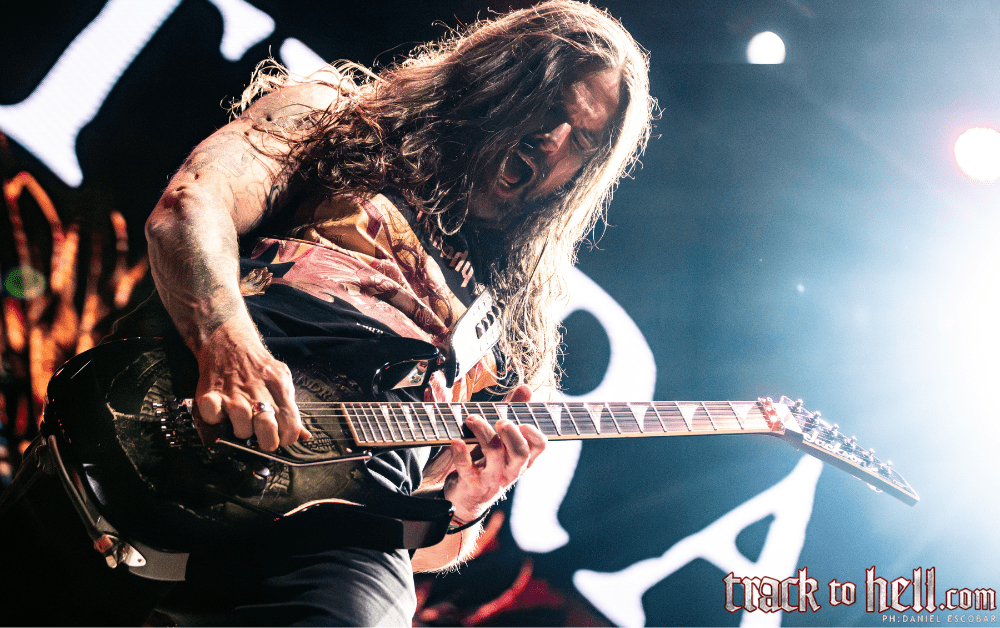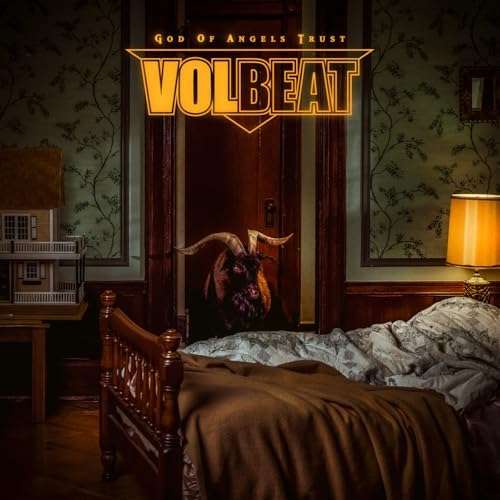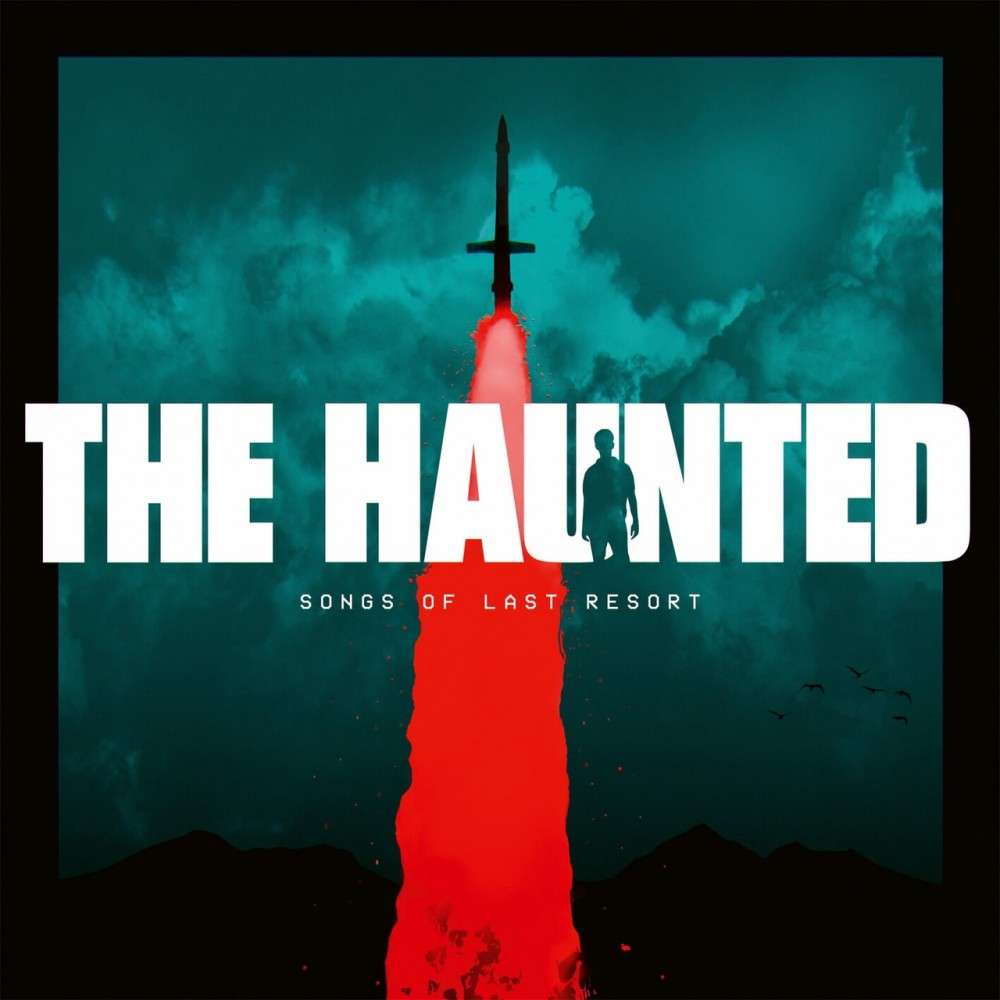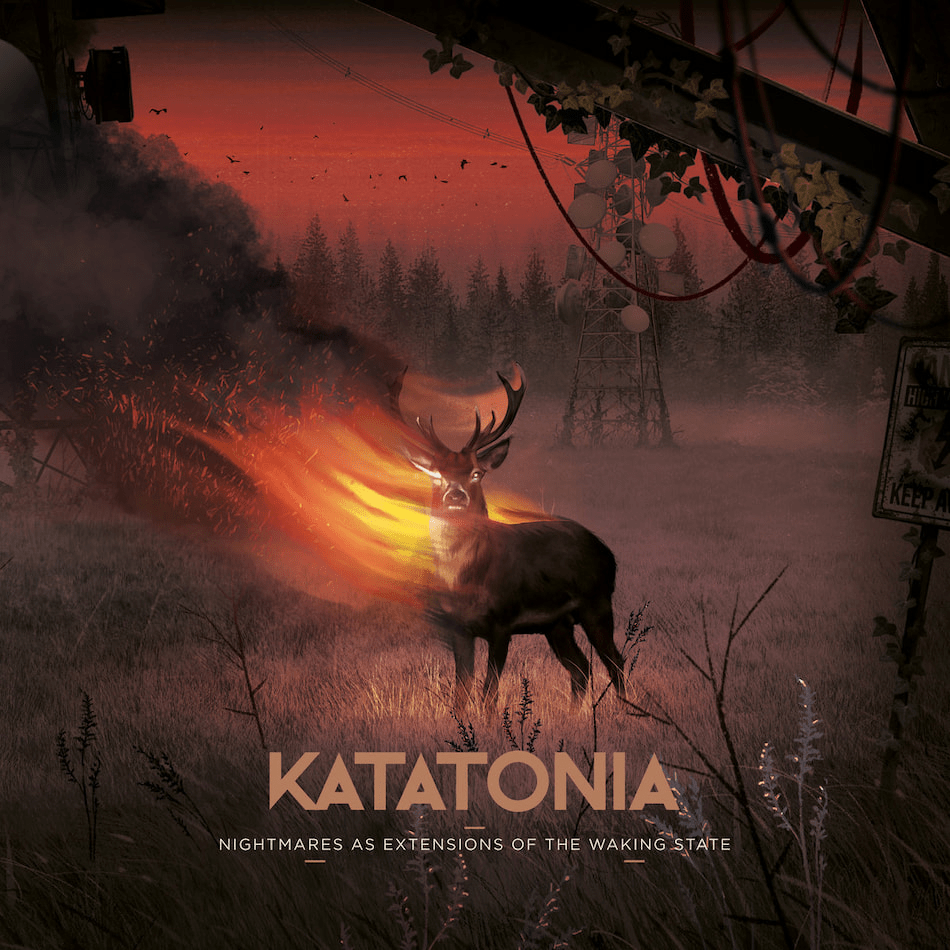


Cathari, a band hailing from Philadelphia, came to light in 2019 with Corporeality, an excellent debut album. After an unprecedented pandemic, some lineup changes and others in the personal lives of its members, the group returned this year with In God’s Infinite Silence. Currently, Cathari consists of Magdalena Stephens (composer, vocalist, noise), Kevin Nolan (lead guitar), Ty Miller (rhythm guitar, noise), Zack Van Sant (bass) and Michael Quigley (drums, percussion composition).
-First of all, I wanted to thank you very much, Mag, for this interview. When I listened to Corporeality, your previous album, it really caught my attention and I immediately loved it. It sounded so different from everything else, you know. I listen to tons of music all the time, and your style stood out. It was beautifully dark, sometimes calm and suddenly violent, the clean vocals were haunting and the harsh ones so passionate. Now, you’ve just released In God’s Infinite Silence and I was shocked in the best possible way. What do you think are the main differences and why? What happened in between?
M: I think I became more comfortable with who I am. When I wrote Corporeality, I was dealing with a profound identity crisis, so much so that I even misrepresented the meaning of some songs in interviews so as to hide what I really meant by them. Corporeality was really about accepting and grieving that I have not been given everything I would have wanted in an ideal life, that my assigned gender did not match how I saw myself, that my life felt tumultuous; I felt overpowered by escapism and hedonism, as I had no other ways to cope. In the new record, the sense of despair is far more pointed, far more honed, there is a rage that percolates in the background of much of the sadness as well. I am not floundering in an abyss of repression and self-denial, but rather coming to understand that the world around me is an ugly place and it has been for a long time. Much of the record is coming to grips with what that means to me.

Between both records I experienced the loss of many friends through growing apart and the loss of many parts of myself that I am unashamed to leave behind. I committed myself to sobriety from alcohol over two years ago, and no longer use other drugs to the extent I was during the Corporeality years. I’ve taken great strides to not be my own worst enemy. In essence, Corporeality sought to find beauty in the sadness of a life unlived, where as In God’s Infinite Silence is a direct and visceral journey through the rage of being a conscientious person, and in particular moments a trans woman, living in the core of one of history’s most monstrous empires.
-One of the many reasons why I love Cathari is because I listen to all kinds of music, but there are certain artists who have a mythical halo to me, like David Bowie, Lou Reed, Jim Morrison or Nick Cave, and the relatively calm passages in your music, with the clean vocals, remind me of them in the sense that they were emotionally intense by means of a raw simplicity. They sounded so sincere, as if they were talking to the listener from the heart, about their everyday lives in a way that deserved to be classic. There are thousands of bands with both clean and harsh vocals, rather smooth moments and aggressive ones, but that has become a common pattern already. I don’t feel Cathari follows that pattern, that’s why I experience a deep connection to your music and I get vibes coming from a beloved past, not from current trends. Why do you believe this happens?
M: I think the answer is simply that I am unashamed of my influences. I went to music school and studied both classical and jazz traditions. One quality I always appreciated about later eras of western orchestral and operatic music was the desire to be extremely expressive of the message and emotion of a given piece of music; to elevate words beyond just words into soaring sensations that take you into the moment. I use what I learned as much as I can to give listeners the same feeling, of being swallowed whole by the world I’m trying to evoke through my lyrics. I don’t want you to understand the message, I want you to feel it in your bones. I want you to shake as I have shaken in the cold of the night.
YOU MAY ALSO LIKE: Cathari – In God’s Infinite Silence (2023)
-Your approach to clean singing has always been wonderful and I think it’s very important to convey the emotions you want to express, but the harsh vocals on this new album are brutal, more powerful and intense than ever. Why? Am I wrong if I think you’re furious?
M: It’s exactly as you say, I’m furious and rightly so. I’m a trans woman living in the United States of America in 2023. I know so much more than I used to about the true scale of the USA’s empire and its violence around the globe. I’m sure I only know a fraction of what there is to know and that is terrifying to me. It’s fury and fear, sometimes in equal measure.
-Let’s talk about the lyrics, both on Corporeality and In God’s Infinite Silence. What do they deal with? What’s the creative process behind them, in terms of inspiration and their relationship to the music?
M: I always write lyrics before music, and then use the lyrics to inform how the music should sound. Once both are starting to fit together, I will refine and edit until I feel a piece is close to what I envisioned. Corporeality is about grieving my life as virtually unlived up to that point. I was still closeted when it came out, and even dishonest in some interviews about the meaning of some pieces, particularly the title track. In God’s Infinite Silence is very much about awakening to the true nature of the world, its ugliness, and my struggles to find a place in it and fears that there may be no world worth saving once we can muster enough collective power to remove the current structure of oppression that plagues the globe.
When I write, it flows from the incredibly overwhelming feelings I’m having coping with some aspect of life. I wrote Wolves in a Cage when having immense difficulty in my relationship during the COVID pandemic as I came to realize we were two traumatized people lashing out on impulse because we knew no other way to confront the kinds of conflicts we were dealing with, for example.

-I can find a connection between the band’s name and your two album titles. I might be speculating, that’s why I’d love to know more about your choices. I believe there’s a strong ideological background that you manage to express with amazing subtlety. Would you like to talk about certain social issues that might be considered traits of the current zeitgeist in the US and the rest of the world?
M: The name of the band was chosen for two reasons. The first is simple, it was available. The second is that I like what Cathars represent in context with our current place in history: that heaven is our relief before and after the trappings of the corporeal, and hell is the plane we exist in now, for we have made it so. It stands in ideological defiance of most hegemony and exposes its hypocrisy. It is always those who preach that they know best for humanity who also must oppress and kill and erase, all to “prove” it.
-Speaking of connections, is there any kind of relationship between the two album covers? If not, I’d like to know more about them because I really feel they match your music and your changes.
M: There is actually no correlation between them, it’s the least thoughtful aspect of this band! The first album cover is an abstract portrait of my lovely partner, Liv, which was taken by a friend of ours, and the second is a fantastic piece of art by Rio Oka Wardana (@digtrash.art on Instagram). I like when an album cover exists in ambiguity but conveys a sense of something implacable. I think both album covers accomplish that nicely.
YOU MAY ALSO LIKE: Sunrot – The Unfailing Rope (2023)
-My favorite tracks from the new album are The Tipping Point, Children of Men and Beautiful Boy. I think they show how much the band has evolved and how versatile you’ve become. Tell me more about these songs, lyrically and musically speaking. What happened to you guys? Seriously, whatever happened to you, I love the consequences.
M: I got older and admitted that I listen to a lot of death metal and sludge. The band had some lineup changes that forced me to be a lot more intentional with who I recruit and I think we’re on our best lineup yet. The Tipping Point is an escapist fantasy of the day we all grow tired of our bondage and slavish devotion to capital and lash out against our oppressors in a blaze of violence. Children of Men is about the rise of fascist ideology and the ruling class’s desire to have the rest of us cannibalize one another through it so we do not realize they are the enemy. Beautiful Boy is about men who do unspeakable things and hide in the protective arms of patriarchy and power. It’s about a mass shooter who receives sympathy on the news for his troubles or the serial sex offender in your community who is given a pass to do what he likes because he runs an underground music venue.
YOU MAY ALSO LIKE: Liturgy – 93696 (2023)
-This question is commonplace, I know, but I’m very curious about your influences and also about the bands you listen to nowadays. What do you think about the underground music scene today and the aftermath of the pandemic?
M: I’ve recently been listening to a lot of music like Chat Pile, Crippling Alcoholism, and Intercourse. Something about the raw degeneracy expressed through their pounding and relentless passages really does it for me. The lyrics are absolutely fucked up and I can’t get enough. I think it’s because it’s just like what we do, taking the darkest parts of ourselves and turning them into works of art that inspire discomfort and unease. It’s changed how I think about lyrics as a lot of these bands write in a conversational tone that isn’t looking for the most flowery way to say something, rather the way they would say it in their lowest moments. It pulls you in and grips you.
In a lot of ways the underground is doing well, but there are problems like any other time. Currently, it seems a lot of cities are seeing large concentrations of influence in just a few booking companies’ hands, which is not helping to keep gigs diverse. Just a few bands tend to get all the opportunities, even though there are plenty of other bands in the city doing the same things and playing arguably comparable quality music. I think a lot of people have lost their sense of etiquette so it is difficult to agree on what standards we all hold one another to, and it has become a big mess. On the other hand, there are a lot of people who stand in defiance of these problems that are making amazing music and lots of supportive people are engaging with the scene more than ever. I’m optimistic about the future of the underground as we steadily recover from the pandemic’s effects.
-Is there anything else you’d like to tell our readers about the band, your plans for the future, your hopes and fears?
M: Build a strong community, tell your friends you love them, and prepare for everything to get worse. Even when we have nothing else, if we can rely on each other, we are better off. Cathari will be here with you all the way down, crying out in despair and righteous anger.
P.S.: We are planning to come to South America as soon as we reasonably can. I cannot promise dates, but I can promise that this is one of our primary goals for the future.



Cathari, a band hailing from Philadelphia, came to light in 2019 with Corporeality, an excellent debut album. After an unprecedented pandemic, some lineup changes and others in the personal lives of its members, the group returned this year with In God’s Infinite Silence. Currently, Cathari consists of Magdalena Stephens (composer, vocalist, noise), Kevin Nolan (lead guitar), Ty Miller (rhythm guitar, noise), Zack Van Sant (bass) and Michael Quigley (drums, percussion composition).
-First of all, I wanted to thank you very much, Mag, for this interview. When I listened to Corporeality, your previous album, it really caught my attention and I immediately loved it. It sounded so different from everything else, you know. I listen to tons of music all the time, and your style stood out. It was beautifully dark, sometimes calm and suddenly violent, the clean vocals were haunting and the harsh ones so passionate. Now, you’ve just released In God’s Infinite Silence and I was shocked in the best possible way. What do you think are the main differences and why? What happened in between?
M: I think I became more comfortable with who I am. When I wrote Corporeality, I was dealing with a profound identity crisis, so much so that I even misrepresented the meaning of some songs in interviews so as to hide what I really meant by them. Corporeality was really about accepting and grieving that I have not been given everything I would have wanted in an ideal life, that my assigned gender did not match how I saw myself, that my life felt tumultuous; I felt overpowered by escapism and hedonism, as I had no other ways to cope. In the new record, the sense of despair is far more pointed, far more honed, there is a rage that percolates in the background of much of the sadness as well. I am not floundering in an abyss of repression and self-denial, but rather coming to understand that the world around me is an ugly place and it has been for a long time. Much of the record is coming to grips with what that means to me.

Between both records I experienced the loss of many friends through growing apart and the loss of many parts of myself that I am unashamed to leave behind. I committed myself to sobriety from alcohol over two years ago, and no longer use other drugs to the extent I was during the Corporeality years. I’ve taken great strides to not be my own worst enemy. In essence, Corporeality sought to find beauty in the sadness of a life unlived, where as In God’s Infinite Silence is a direct and visceral journey through the rage of being a conscientious person, and in particular moments a trans woman, living in the core of one of history’s most monstrous empires.
-One of the many reasons why I love Cathari is because I listen to all kinds of music, but there are certain artists who have a mythical halo to me, like David Bowie, Lou Reed, Jim Morrison or Nick Cave, and the relatively calm passages in your music, with the clean vocals, remind me of them in the sense that they were emotionally intense by means of a raw simplicity. They sounded so sincere, as if they were talking to the listener from the heart, about their everyday lives in a way that deserved to be classic. There are thousands of bands with both clean and harsh vocals, rather smooth moments and aggressive ones, but that has become a common pattern already. I don’t feel Cathari follows that pattern, that’s why I experience a deep connection to your music and I get vibes coming from a beloved past, not from current trends. Why do you believe this happens?
M: I think the answer is simply that I am unashamed of my influences. I went to music school and studied both classical and jazz traditions. One quality I always appreciated about later eras of western orchestral and operatic music was the desire to be extremely expressive of the message and emotion of a given piece of music; to elevate words beyond just words into soaring sensations that take you into the moment. I use what I learned as much as I can to give listeners the same feeling, of being swallowed whole by the world I’m trying to evoke through my lyrics. I don’t want you to understand the message, I want you to feel it in your bones. I want you to shake as I have shaken in the cold of the night.
YOU MAY ALSO LIKE: Cathari – In God’s Infinite Silence (2023)
-Your approach to clean singing has always been wonderful and I think it’s very important to convey the emotions you want to express, but the harsh vocals on this new album are brutal, more powerful and intense than ever. Why? Am I wrong if I think you’re furious?
M: It’s exactly as you say, I’m furious and rightly so. I’m a trans woman living in the United States of America in 2023. I know so much more than I used to about the true scale of the USA’s empire and its violence around the globe. I’m sure I only know a fraction of what there is to know and that is terrifying to me. It’s fury and fear, sometimes in equal measure.
-Let’s talk about the lyrics, both on Corporeality and In God’s Infinite Silence. What do they deal with? What’s the creative process behind them, in terms of inspiration and their relationship to the music?
M: I always write lyrics before music, and then use the lyrics to inform how the music should sound. Once both are starting to fit together, I will refine and edit until I feel a piece is close to what I envisioned. Corporeality is about grieving my life as virtually unlived up to that point. I was still closeted when it came out, and even dishonest in some interviews about the meaning of some pieces, particularly the title track. In God’s Infinite Silence is very much about awakening to the true nature of the world, its ugliness, and my struggles to find a place in it and fears that there may be no world worth saving once we can muster enough collective power to remove the current structure of oppression that plagues the globe.
When I write, it flows from the incredibly overwhelming feelings I’m having coping with some aspect of life. I wrote Wolves in a Cage when having immense difficulty in my relationship during the COVID pandemic as I came to realize we were two traumatized people lashing out on impulse because we knew no other way to confront the kinds of conflicts we were dealing with, for example.

-I can find a connection between the band’s name and your two album titles. I might be speculating, that’s why I’d love to know more about your choices. I believe there’s a strong ideological background that you manage to express with amazing subtlety. Would you like to talk about certain social issues that might be considered traits of the current zeitgeist in the US and the rest of the world?
M: The name of the band was chosen for two reasons. The first is simple, it was available. The second is that I like what Cathars represent in context with our current place in history: that heaven is our relief before and after the trappings of the corporeal, and hell is the plane we exist in now, for we have made it so. It stands in ideological defiance of most hegemony and exposes its hypocrisy. It is always those who preach that they know best for humanity who also must oppress and kill and erase, all to “prove” it.
-Speaking of connections, is there any kind of relationship between the two album covers? If not, I’d like to know more about them because I really feel they match your music and your changes.
M: There is actually no correlation between them, it’s the least thoughtful aspect of this band! The first album cover is an abstract portrait of my lovely partner, Liv, which was taken by a friend of ours, and the second is a fantastic piece of art by Rio Oka Wardana (@digtrash.art on Instagram). I like when an album cover exists in ambiguity but conveys a sense of something implacable. I think both album covers accomplish that nicely.
YOU MAY ALSO LIKE: Sunrot – The Unfailing Rope (2023)
-My favorite tracks from the new album are The Tipping Point, Children of Men and Beautiful Boy. I think they show how much the band has evolved and how versatile you’ve become. Tell me more about these songs, lyrically and musically speaking. What happened to you guys? Seriously, whatever happened to you, I love the consequences.
M: I got older and admitted that I listen to a lot of death metal and sludge. The band had some lineup changes that forced me to be a lot more intentional with who I recruit and I think we’re on our best lineup yet. The Tipping Point is an escapist fantasy of the day we all grow tired of our bondage and slavish devotion to capital and lash out against our oppressors in a blaze of violence. Children of Men is about the rise of fascist ideology and the ruling class’s desire to have the rest of us cannibalize one another through it so we do not realize they are the enemy. Beautiful Boy is about men who do unspeakable things and hide in the protective arms of patriarchy and power. It’s about a mass shooter who receives sympathy on the news for his troubles or the serial sex offender in your community who is given a pass to do what he likes because he runs an underground music venue.
YOU MAY ALSO LIKE: Liturgy – 93696 (2023)
-This question is commonplace, I know, but I’m very curious about your influences and also about the bands you listen to nowadays. What do you think about the underground music scene today and the aftermath of the pandemic?
M: I’ve recently been listening to a lot of music like Chat Pile, Crippling Alcoholism, and Intercourse. Something about the raw degeneracy expressed through their pounding and relentless passages really does it for me. The lyrics are absolutely fucked up and I can’t get enough. I think it’s because it’s just like what we do, taking the darkest parts of ourselves and turning them into works of art that inspire discomfort and unease. It’s changed how I think about lyrics as a lot of these bands write in a conversational tone that isn’t looking for the most flowery way to say something, rather the way they would say it in their lowest moments. It pulls you in and grips you.
In a lot of ways the underground is doing well, but there are problems like any other time. Currently, it seems a lot of cities are seeing large concentrations of influence in just a few booking companies’ hands, which is not helping to keep gigs diverse. Just a few bands tend to get all the opportunities, even though there are plenty of other bands in the city doing the same things and playing arguably comparable quality music. I think a lot of people have lost their sense of etiquette so it is difficult to agree on what standards we all hold one another to, and it has become a big mess. On the other hand, there are a lot of people who stand in defiance of these problems that are making amazing music and lots of supportive people are engaging with the scene more than ever. I’m optimistic about the future of the underground as we steadily recover from the pandemic’s effects.
-Is there anything else you’d like to tell our readers about the band, your plans for the future, your hopes and fears?
M: Build a strong community, tell your friends you love them, and prepare for everything to get worse. Even when we have nothing else, if we can rely on each other, we are better off. Cathari will be here with you all the way down, crying out in despair and righteous anger.
P.S.: We are planning to come to South America as soon as we reasonably can. I cannot promise dates, but I can promise that this is one of our primary goals for the future.



















![Amenra – De Toorn & With Fang and Claw (2025) [EPs] thumb image](https://tracktohell.com/wp-content/uploads/2025/06/amenraeps.png)




